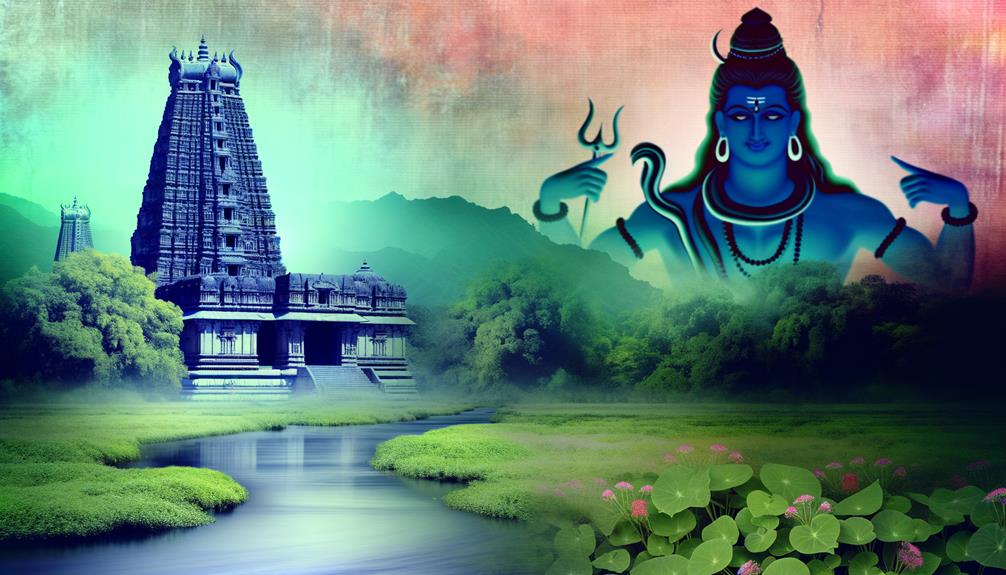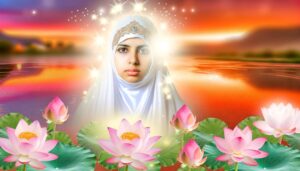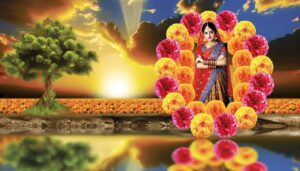Rudra Name Meaning in Hindi
Rudra, derived from the Sanskrit root 'rud,' means 'howler' in Hindi. This name carries weighty cultural and historical implications.
In Vedic traditions, Rudra represents a fierce storm god, embodying both destruction and healing. The deity's role symbolizes the delicate balance between life and death, making Rudra a central figure in Hindu cosmology.
By invoking Rudra, devotees seek protection and purification, highlighting the god's dual nature. This name continues to influence spiritual practices and popular culture today, symbolizing inner transformation and resilience.
There's rich symbolism and deeper layers of meaning waiting to be uncovered.

Key Takeaways
- रुद्र का अर्थ हिंदी में "दहाड़ने वाला" या "रोने वाला" होता है।
- रुद्र का नाम संस्कृत के 'रुद' मूल से लिया गया है।
- रुद्र वेदों में प्रारंभिक देवताओं में से एक हैं, जिन्हें उग्र तूफान देवता माना जाता है।
- रुद्र का नाम विनाश और पुनर्जन्म का प्रतीक है।
- रुद्र को शिव और भव जैसे अन्य नामों से भी जाना जाता है।
Origin of the Name
Have you ever pondered the ancient origins of the name Rudra and its profound cultural significance in Hindu mythology?
Rudra, derived from the Sanskrit root 'rud,' meaning 'to howl' or 'cry,' is one of the earliest deities mentioned in the Vedas. In Rigveda, Rudra is a storm god, embodying both creation and destruction. This dual nature illustrates the cyclical concept of life and death, crucial in Hindu cosmology.
Rudra's fierce, unpredictable demeanor also symbolizes the untamed aspects of nature. As you explore further, you'll find Rudra is often considered a precursor to Shiva, one of Hinduism's principal deities. Understanding Rudra's name reveals a layered narrative rich in symbolism and cultural depth, essential for comprehending Hindu beliefs and traditions.
Historical Significance
In examining the historical significance of Rudra, you'll discover the deity's pivotal role in shaping early Vedic rituals and religious practices. Rudra's presence in the Rigveda, one of the oldest sacred texts, highlights his importance. As a fierce storm god, Rudra's attributes commanded both reverence and fear, influencing numerous hymns and rituals. His dual nature as both healer and destroyer exemplifies the complex understanding of divine forces in Vedic society.
| Aspect | Description |
|---|---|
| Textual Mention | Found prominently in the Rigveda |
| Ritual Influence | Central to many Vedic hymns and rituals |
| Divine Attributes | Known as a fierce storm god, healer, and destroyer |
| Societal Impact | Shaped the perception of divine forces in Vedic times |
Understanding Rudra's historical significance provides insight into the evolution of early Indian religious thought.
Cultural Context
Understanding the cultural context of the name Rudra necessitates taking into account both its historical significance and religious importance in Hinduism. Rudra is often associated with storm and hunting, embodying both fierce and benevolent qualities, which reflect the dual nature of the divine in Hindu belief. The name has deep roots in ancient texts, appearing in the Vedas and Upanishads, where it is linked to the concepts of transformation and protection. In exploring names related to Rudra, one might also encounter variations like “Rio,” which carries a distinct charm, with ‘rio name meaning in hindi‘ highlighting its unique interpretation in the linguistic context of India.
Historically, Rudra represents a fierce aspect of Shiva, embodying his power and wrath.
Religiously, invoking Rudra signifies seeking protection and divine intervention, reflecting deep-rooted beliefs and practices in Hindu culture.
Historical Significance
Rudra's name, deeply embedded in Vedic scriptures, symbolizes a fierce and powerful deity, reflecting ancient India's complex spiritual and cultural landscape. You'll find Rudra mentioned in the Rigveda, where he's depicted as a storm god and a bringer of both disease and healing.
This duality highlights the ancient understanding of nature's unpredictable power. Historically, Rudra's fierce attributes were both feared and revered, mirroring the societal need to respect the forces beyond human control.
As you explore further, you'll see Rudra's influence extending into later Hindu traditions, illustrating an evolution from a fearsome god to a more benevolent aspect. Understanding Rudra's historical significance provides a window into the values and beliefs of early Indian civilization.
Religious Importance
Rudra plays a crucial role in Hinduism, embodying the dual forces of destruction and regeneration that are prevalent in the religion's philosophy.
When you explore the Vedic texts, you'll find that Rudra isn't just a fearsome deity but also a healer, often invoked for his ability to remove ailments. This duality mirrors Hinduism's broader comprehension of life's cyclical nature.
As a form of Shiva, Rudra's destructive aspect paves the way for creation and renewal, symbolizing the necessary balance between life and death.
Through the Rudra Mantra, devotees seek both protection and purification, demonstrating his significance in daily spiritual practices.
Grasping Rudra's religious importance enhances your understanding of Hindu cosmology and its intricate interplay of opposites.
Mythological Connections
When exploring Rudra's mythological connections, you'll find his origins in the Vedas, where he's a fierce storm deity.
As Hinduism evolved, Rudra became synonymous with Shiva, embodying both destruction and regeneration.
His divine attributes, such as being the lord of animals and the wielder of powerful energy, highlight his complex and multifaceted nature.
Rudra in Vedas
In the Vedas, the figure of Rudra emerges as a complex deity embodying both the fierce and benevolent aspects of nature, highlighting his dualistic role within ancient Hindu mythology.
You'll find Rudra associated with storms and healing, reflecting his ability to both destroy and nurture. His name itself, derived from the root 'rud,' meaning 'to cry' or 'to howl,' signifies his tempestuous nature.
Rudra is invoked in the Rigveda as a formidable protector yet also as a healer, addressed with epithets like 'Shiva' (the auspicious one) and 'Bhava' (existence). This duality illustrates the Vedic understanding that creation and destruction are intertwined forces within the cosmos, making Rudra a pivotal figure in Hindu spiritual thought.
Shiva and Rudra
As you explore the mythological connections, you'll find that the Vedic Rudra gradually evolved into the widely revered deity Shiva, embodying a synthesis of destruction and benevolence in Hindu tradition.
Rudra, initially a fierce storm god, is often depicted in the Vedas as a force of nature, commanding respect and fear.
Over time, this fierce aspect merged with Shiva's more complex persona, known for his roles as the destroyer and transformer within the Trimurti.
Shiva's dynamic nature, encompassing both asceticism and eroticism, reflects Rudra's primal energy.
This evolution highlights the fluidity in Hindu mythology where deities transform and amalgamate, allowing you to appreciate how Rudra's traits were integrated into the multifaceted identity of Shiva.
Rudra's Divine Attributes
Rudra's divine attributes, deeply rooted in Vedic literature, encapsulate a duality of destructive power and healing prowess, inviting you to understand his complex role in Hindu cosmology.
You'll find that Rudra is often depicted as a fierce storm deity, embodying the raw, untamed energy of nature. Yet, he's also revered as a protective healer, known to alleviate suffering and bestow blessings.
This duality is essential for grasping Rudra's significance: he embodies the cyclical nature of creation and destruction, a fundamental concept in Hindu thought.
Symbolism and Imagery
The name Rudra evokes powerful symbolism and rich imagery deeply embedded in Hindu mythology and spiritual tradition. As you explore the essence of Rudra, you'll discover that it represents a multifaceted deity embodying both destruction and renewal. This duality is essential in understanding Rudra's role in the cosmic order.
- Destruction: Rudra is often depicted wielding fierce weapons, symbolizing the power to eliminate ignorance and obstacles.
- Renewal: Post-destruction, Rudra facilitates rebirth and rejuvenation, highlighting the cyclical nature of life.
- Ferocity and Compassion: Despite his fearsome demeanor, Rudra's compassion towards devotees underscores a complex, benevolent aspect.
In this context, Rudra's imagery serves as a profound reminder of the balance between creation and destruction in the universe.
Modern Interpretations
In modern times, interpretations of Rudra have evolved to reflect contemporary spiritual and cultural dynamics, emphasizing his relevance in today's world.
You might find that Rudra is increasingly seen not just as a fierce deity but also as a symbol of inner transformation and resilience. This shift highlights the adaptability of ancient archetypes in addressing modern existential challenges.
Contemporary spiritual practices often invoke Rudra for personal empowerment, blending age-old reverence with modern self-improvement ideals. Additionally, Rudra's association with nature and the environment gains new importance, mirroring current ecological concerns.
Influence on Popular Culture
Amidst the vibrant landscape of popular culture, Rudra emerges not just as an ancient deity but as a potent symbol woven into films, literature, and music. You'll notice how filmmakers and authors tap into Rudra's fierce and transformative essence to evoke themes of destruction and rebirth.
In music, artists often invoke Rudra to convey intensity and spiritual depth.
Films: Directors use Rudra's imagery to symbolize chaos and transformation, often in epic narratives.
Literature: Writers draw on Rudra's mythos to explore complex character arcs and moral dilemmas.
Music: Composers and lyricists invoke Rudra to add layers of intensity and mysticism to their works.
Understanding Rudra's role in popular culture helps you grasp its profound impact on modern storytelling and artistic expression.
Conclusion
In juxtaposing Rudra's ancient origins with its modern interpretations, you see a name that bridges millennia. Historically, it's invoked fear and reverence; culturally, it signifies both destruction and renewal.
Mythologically, Rudra embodies fierce divinity, yet symbolically, it represents the cyclical nature of life.
Today, Rudra resonates in popular culture, from films to literature, echoing its enduring legacy. The name Rudra, hence, isn't just a word—it's a complex tapestry of history, culture, and timeless symbolism.






